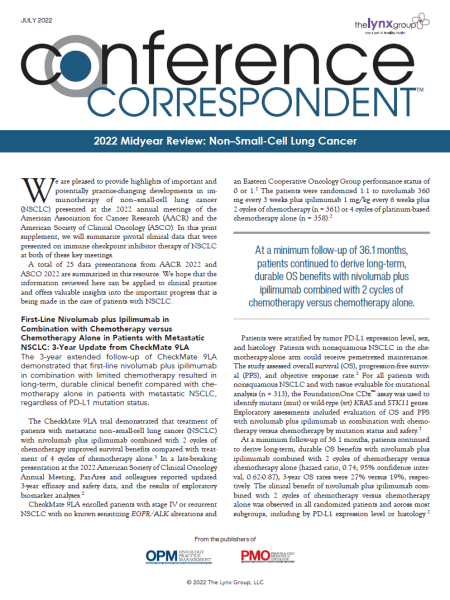After 3 years of follow-up, nivolumab combined with ipilimumab demonstrates sustained OS rates in treatment-naïve patients with advanced NSCLC.
Researchers continue to explore the clinical efficacy of nivolumab combined with ipilimumab in treatment-naïve patients with advanced NSCLC who do not have EGFR or ALK aberrations. In part 1 of the phase 3 CheckMate-227 study, first-line use of the nivolumab plus ipilimumab combination was shown to significantly improve OS compared with chemotherapy after a minimum follow-up of 29 months.1 During the 2020 ASCO Virtual Scientific Program, the CheckMate-227 researchers reported data after a minimum 3-year follow-up from this clinical trial.2
The CheckMate-227 trial enrolled treatment-naïve patients with NSCLC, including patients whose tumor PD-L1 expression was ≥1% (for the primary analysis) or <1% (for the prespecified descriptive analysis).2 A total of 1189 patients with stage IV or recurrent NSCLC and PD-L1 expression ≥1% were randomized to receive nivolumab (3 mg/kg every 2 weeks) plus ipilimumab (1 mg/kg every 6 weeks), nivolumab alone (240 mg every 2 weeks), or chemotherapy (pemetrexed plus cisplatin or carboplatin).2 Among 550 patients whose PD-L1 expression level was <1%, randomized treatments included nivolumab plus ipilimumab combination, nivolumab (360 mg every 3 weeks) plus chemotherapy, or chemotherapy.2 In patients with PD-L1 expression ≥1%, the study’s primary end point was OS (nivolumab plus ipilimumab vs chemotherapy). At 6 months, an exploratory analysis of OS in patients was conducted by patients’ response status: complete response, partial response, stable disease, and progressive disease.2
Data were locked on February 28, 2020, after minimum follow-up of 37.7 months for OS.2 Among patients with PD-L1 expression ≥1%, continued OS benefit was observed with the nivolumab plus ipilimumab combination compared with chemotherapy (HR, 0.79; 95% CI, 0.67-0.93).2 The 3-year OS rates were 33% for the nivolumab plus ipilimumab combination, 29% for nivolumab monotherapy, and 22% for chemotherapy.2 At 3 years, 18% of patients with PD-L1 levels ≥1% who were treated with the nivolumab plus ipilimumab combination remained progression-free compared with 12% of patients receiving nivolumab and 4% of patients receiving chemotherapy.2
Among confirmed responders with PD-L1 levels ≥1%, 38% remained in response in the nivolumab plus ipilimumab combination arm at 3 years compared with 32% in the nivolumab arm and 4% in the chemotherapy arm.2
In patients with PD-L1 levels <1%, the OS HR for nivolumab plus ipilimumab compared with chemotherapy was 0.64 (95% CI, 0.51-0.81).2 The 3-year OS rates were 34% for the nivolumab plus ipilimumab combination, 20% for nivolumab plus chemotherapy, and 15% for chemotherapy.2 In this cohort, 13%, 8%, and 2% of patients remained progression-free after 3 years, respectively.2 In addition, 34%, 15%, and 0% of confirmed responders remained in response after 3 years, respectively.2
Patients with PD-L1 expression ≥1% who achieved either complete response or partial response at 6 months had longer subsequent OS with nivolumab plus ipilimumab compared with chemotherapy, whereas patients with stable disease or progressive disease at 6 months had generally similar subsequent OS between treatments.2
Treatment-related AEs of any severity grade were observed in 77% of patients treated with nivolumab plus ipilimumab and 82% of patients treated with chemotherapy.2 Severe (grade 3/4) treatment-related AEs were observed in 33% of patients treated with nivolumab plus ipilimumab and in 36% of patients undergoing chemotherapy.2
Researchers concluded that, after a 3-year minimum follow-up, the nivolumab plus ipilimumab combination continued to provide durable and long-term OS benefit compared with chemotherapy in treatment-naïve patients with advanced NSCLC, regardless of PD-L1 expression levels.2 No new safety signals were identified for nivolumab plus ipilimumab.2 This dual immunotherapy regimen is a novel chemotherapy-sparing first-line treatment option for patients with advanced NSCLC.2
References
1. Hellmann MD, Paz‑Ares L, Caro LB, et al. Nivolumab plus ipilimumab in advanced non–small-cell lung cancer. N Engl J Med. 2019;381:2020-2031.
2. Ramalingam SS, Ciuleanu TE, Pluzanski A, et al. Nivolumab + ipilimumab versus platinum-doublet chemotherapy as first-line treatment for advanced non-small cell lung cancer: three-year update from CheckMate 227 Part 1. J Clin Oncol. 2020;38(15_suppl). Abstract 9500.

